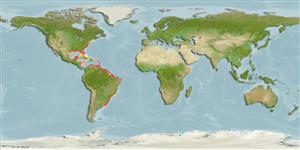Environment: milieu / climate zone / depth range / distribution range
Ecologie
marien; brak water benthopelagisch; diepte 15 - 136 m (Ref. 36453). Subtropical; - 38°S
Western Atlantic: northeastern USA to Rio de Janeiro, Brazil, sometimes reaching Argentina.
Lengte bij maturiteit / Grootte / Gewicht / Leeftijd
Maturity: Lm 12.0 range ? - ? cm
Max length : 36.0 cm TL mannelijk / geslacht onbekend; (Ref. 39376); common length : 18.0 cm TL mannelijk / geslacht onbekend; (Ref. 5217)
Dorsale stekels (totaal) : 2 - 5; Dorsale zachte stralen (totaal) : 38 - 47; Anale stekels: 2 - 3; Anale zachte stralen: 35 - 45. This species is distinguished by the following characters: body very deep (its depth 1.6 to 1.8 in total length), bounded by even curves and strongly compressed; snout short and blunt, about equal to eye diameter; mouth small, tip of maxillary just reaching to below eye margin; teeth in jaws weak, in 1 row, those in the upper jaw slightly recurved, simple and pointed; dorsal and anal fin bases very long (about equal in length), both fins falcate, the length of their longest rays greater than head and preceded by 3 weak spines; caudal fin stiff and deeply forked, both its lobes longer than head; pectoral fins narrow and much longer than head; pelvic fins absent; no conspicuous series of pores below dorsal fin; lateral line high, following dorsal profile; scales small and easily detached, extending to cheeks and bases of vertical fins; body color pale blue to green above, silvery with a golden/yellow tinge below (Ref. 53006).
A pelagic fish forming large schools in coastal bays, inshore waters over the continental shelf and around islands at moderate depths (50 to 70 m) where it occurs throughout the year (Ref. 53006). Juveniles are found in shallow coastal waters under floating weeds; also in or near brackish estuaries (Ref. 5217). The young of less then 10 cm length are often encountered in association with medusae. Adults feed mainly on jellyfish, small fish, crustaceans and worms while juveniles are plankton feeders. Caught mainly with otter trawls, also seines; marketed fresh and frozen (Ref. 53006). Its flesh is well esteemed.
Levenscyclus en paargedrag
Maturiteit | Voortplanting | Paaien | Eieren | Fecunditeit | Larven
Cervigón, F., 1994. Los peces marinos de Venezuela. Volume 3. Fundación Científica Los Roques, Caracas,Venezuela. 295 p. (Ref. 13628)
Status op de Rode Lijst van het IUCN (Ref. 130435: Version 2024-1)
Gevaar voor de mens
Harmless
Gebruik door de mens
Visserij: van minder commercieel belang
Tools
Speciale rapporten
Download XML
Internetbronnen
Estimates based on models
Preferred temperature (Ref.
123201): 14.8 - 27.4, mean 24.2 °C (based on 268 cells).
Fylogenetische diversiteitsindex (Ref.
82804): PD
50 = 0.5020 [Uniqueness, from 0.5 = low to 2.0 = high].
Bayesian length-weight: a=0.01622 (0.01295 - 0.02031), b=2.95 (2.89 - 3.01), in cm total length, based on LWR estimates for this species (Ref.
93245).
Trofisch niveau (Ref.
69278): 4.5 ±0.0 se; based on diet studies.
Weerstandsvermogen (Ref.
120179): Hoog, minimale populatieverdubbelingstijd minder dan 15 maanden (Preliminary K or Fecundity.).
Fishing Vulnerability (Ref.
59153): Low to moderate vulnerability (26 of 100).
Nutrients (Ref.
124155): Calcium = 70.1 [30.9, 192.1] mg/100g; Iron = 0.877 [0.387, 1.939] mg/100g; Protein = 18.1 [16.3, 19.8] %; Omega3 = 0.381 [0.193, 0.755] g/100g; Selenium = 34.6 [13.9, 81.4] μg/100g; VitaminA = 9.82 [2.20, 41.96] μg/100g; Zinc = 0.719 [0.420, 1.210] mg/100g (wet weight);
